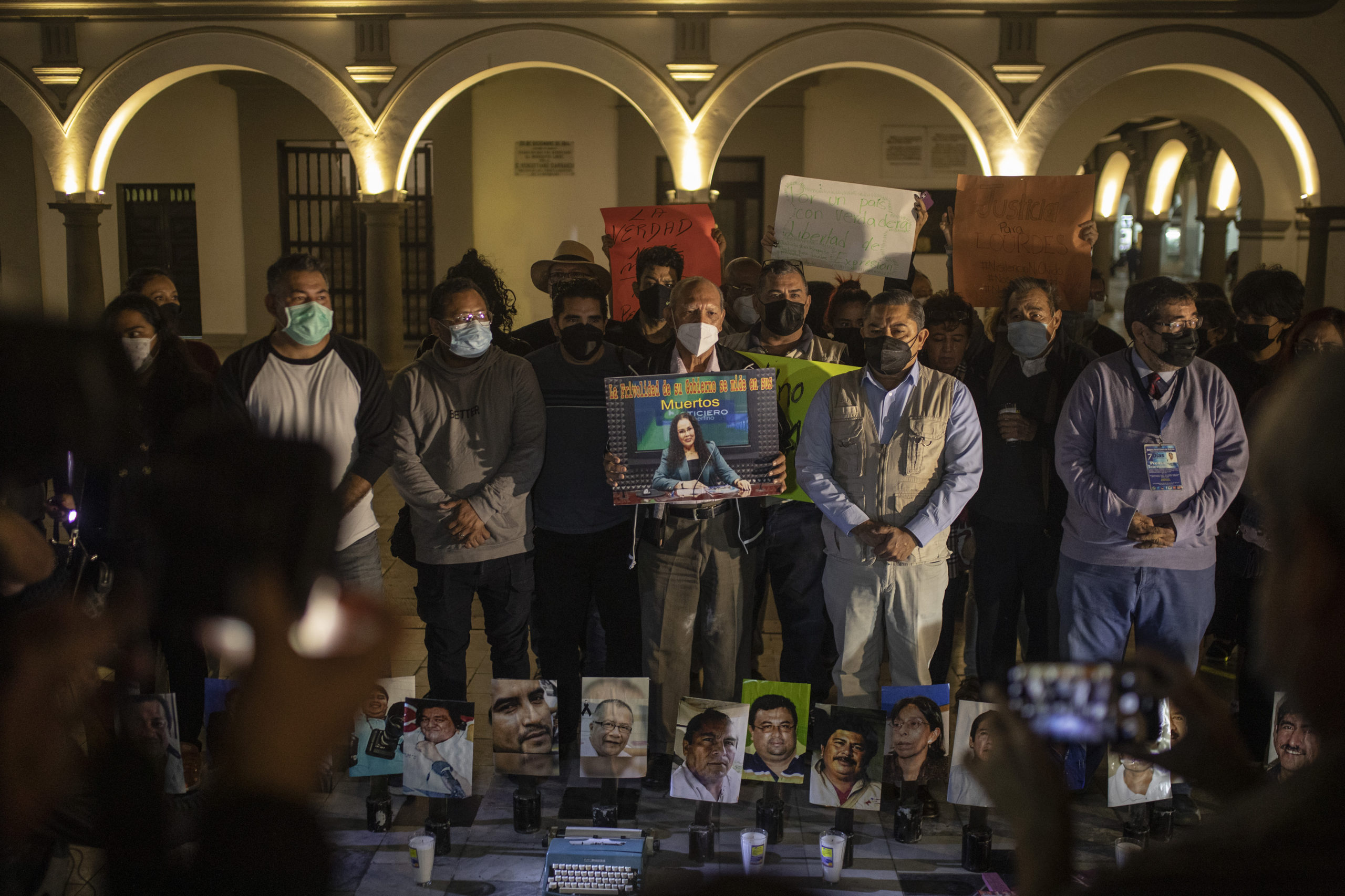
Journalists from Veracruz, Mexico commemorate their killed colleagues with photos in Zocalo Square and demand an end to attacks on journalists during a nationwide demonstration, January 2022
A few years ago, at a conference, I said that Mexico had more protection for journalists and press freedom than the United States, Great Britain, or France. I got confused stares in response. Mexico, as everyone there knew, is considered one of the most dangerous countries for journalists.
The United States, I argued, does not have a special prosecutor for crimes against journalists, nor does Great Britain have a protection mechanism that a reporter or editor under threat can call up for security. There are special laws for the safety of journalists in Mexico. And yet, dozens of journalists have been killed in Mexico in the past decade, and the country averages more than one attack per day against a reporter, editor, or news organization.
Of course, the United States, Great Britain, France, or other advanced democracies do not need entire bodies of law dedicated specifically to press freedom. They do not need, for example, special prosecutors for crimes against journalists if these can be investigated and taken to court by the regular legal system. They do not need special protection mechanisms for journalists under threat if the rule of law makes those threats rare because they are punished.
Lack of rule of law has been the problem for press freedom in Latin America. Governments create institutions, legislatures pass laws, but attacks against journalists keep rising. Efforts to end the impunity that crimes against the press enjoy are hampered by lack of trust in authorities that are either complicit, negligent, or absent.
Not just in Mexico. Violence against journalists is pervasive across much of Latin America, in different forms. According to Reporters Without Borders, in 2020 Latin America was the world region with the highest number of journalists killed.
This year I participated in a project sponsored by UNESCO to examine the efforts across Latin America to strengthen journalist protection and press freedom. The result was a book detailing the experiences journalists have had protecting themselves and pushing their governments to fight and prosecute violence against the media.
It has been 10 years since the United Nations launched the Plan of Action for the Safety of Journalists, recommending measures that governments could take to protect press freedom. It was based on the so-called three “Ps”: Prevention, Protection and Prosecution.
Several Latin American countries have followed suit with mixed results, as a handful of examples show. If press freedom is a condition for a democratic society, then journalists must have guarantees for doing their work safely. The role of government is to swiftly investigate and punish any threat or attack against the press before those aggressions produce a chilling effect. But more often than not, governments are part of the problem.
Mexico implemented a protection mechanism in which journalists under threat could ask for assistance to keep those threats from materializing into an attack. But at least nine journalists under protection of authorities have been killed in the past few years.
Failure can be attributed to many factors: lack of rule of law, weak institutions, public officials having a particular interest in keeping the press intimidated, collusion between authorities and attackers. Mostly, it boils down to a lack of political will. The laws and institutions created on paper are not translated to the real world.
Ten years ago, the Guatemalan government pledged to establish a protection mechanism similar to the one in Mexico in consultation with journalists and press associations. That institution has not been created yet, its efforts falling apart due to lack of trust between the government and journalists. Between 2011 and 2021, 22 journalists have been killed in Guatemala. Most attacks come from public officials or security forces, a factor that complicates matters because the authorities in charge of protecting the rule of law are the ones attacking journalists.
Guatemala did establish a special prosecutor for crimes against journalists in 2020 but it has dismissed more than half of the complaints it has received, according to an analysis of civil society organizations.
In Bolivia, where attacks on journalists were rare before 2018, political violence has increasingly targeted the press, to a degree that journalists have called for the creation of a protection mechanism. The United Nations seconded the call, which intensified after the kidnapping of six journalists covering a land conflict in 2021, something that had never happened before. Violence against journalists had not been widespread in Bolivia, but the kidnapping and the political instability have raised awareness among journalists. So far, the kidnapping has gone unpunished and protection measures have not been instituted by authorities.
These are but a handful of examples in which journalists have been left more vulnerable in the absence of real guarantees for safety, even if institutions have been created for it. Reporters and editors have been left to fend for themselves, establishing safety protocols in newsrooms to minimize the risk of attacks.
New institutions for press freedom will not mean anything if they do not work under a culture of rule of law. Mexico has more attacks against journalists today even now that it has a protection mechanism and a prosecutor to investigate them, than a decade ago when it did not have either. Other countries in Latin America can say the same thing.
In the face of action by authorities, journalists have had to take matters into their own hands to protect themselves, forming groups like Periodistas de a Pie in Mexico or the newly created Network of Central American Journalists. They promote best practices, organize workshops on safety and help journalists with peer support to mitigate risk or stress. They are supported by NGOs like Article19, the Committee to Protect Journalists or Reporters Without Borders, but these efforts cannot fill the gap left by authorities, who for now seem content to create a rule of law only on paper.
Javier Garza Ramos is an independent journalist in Torreón, northern México and an expert on journalist safety. He is the founder of the local news platform EnRe2Laguna and the host of the daily radio newscast Reporte100.


